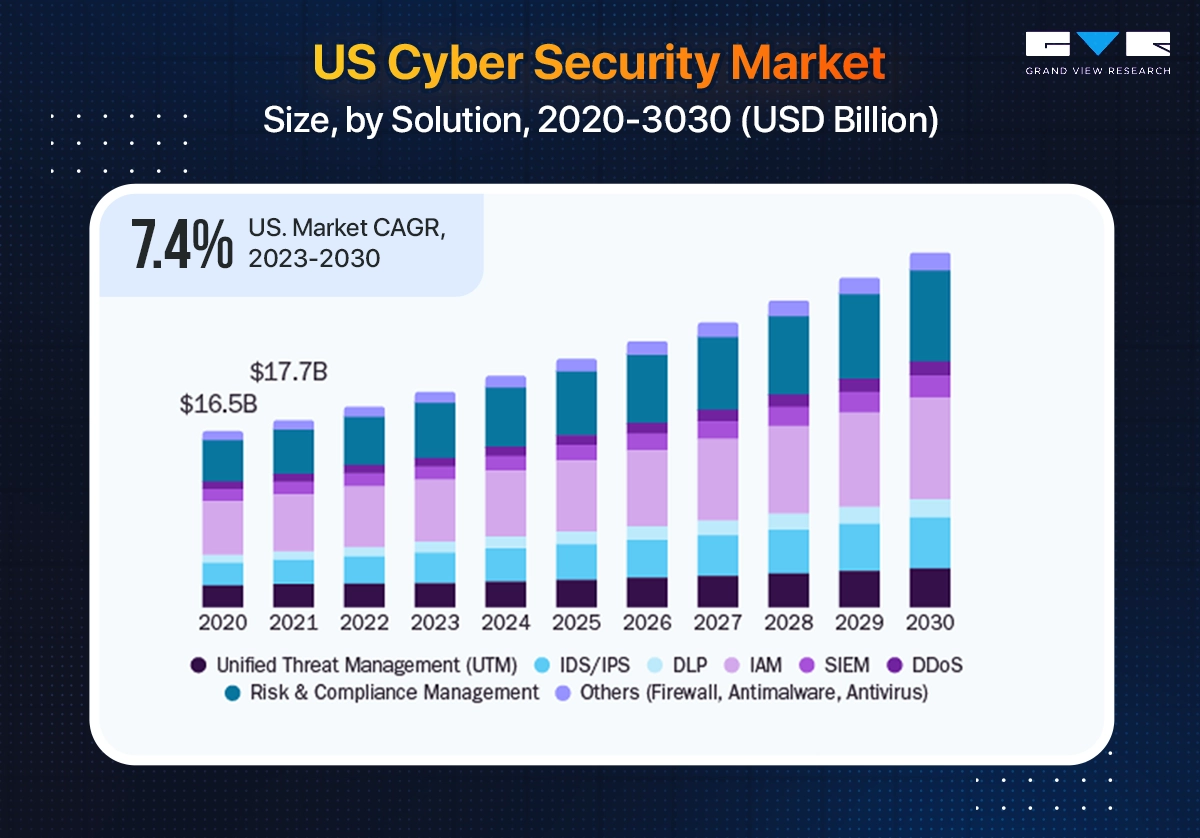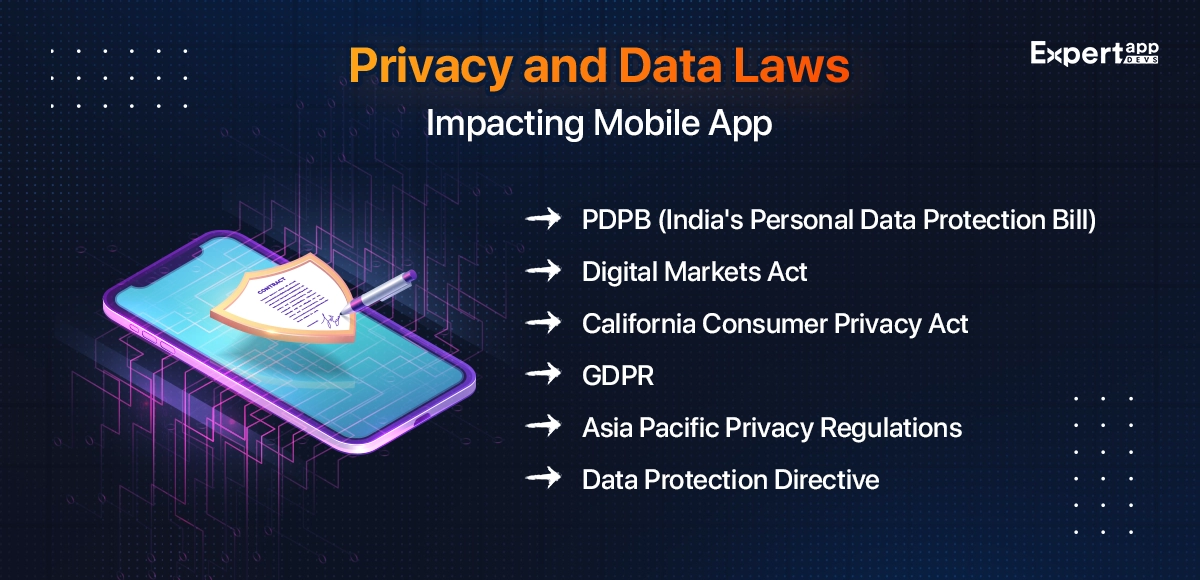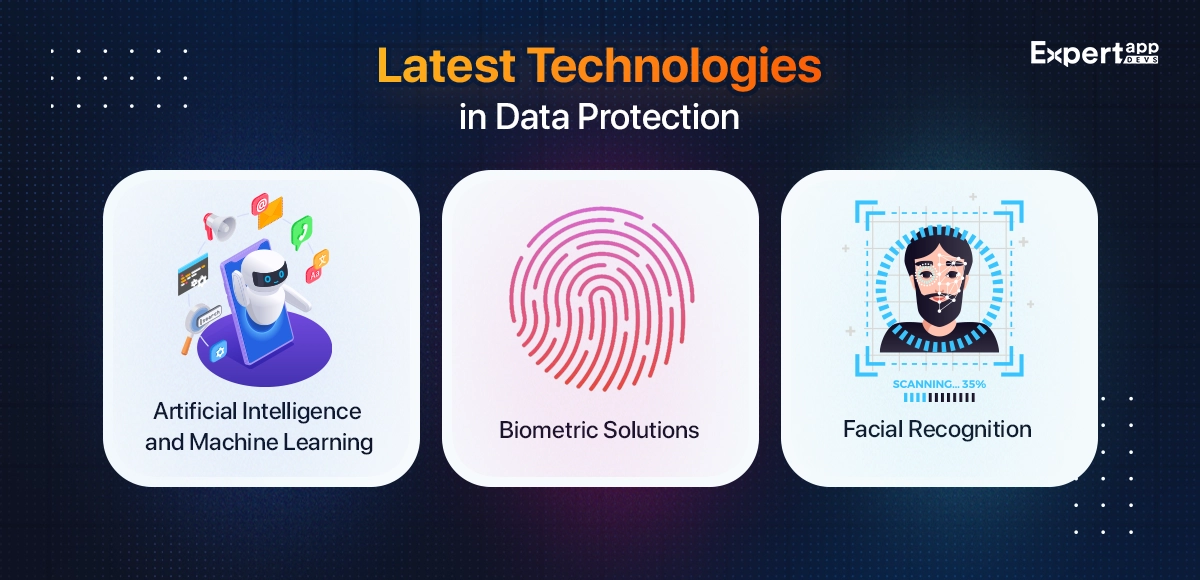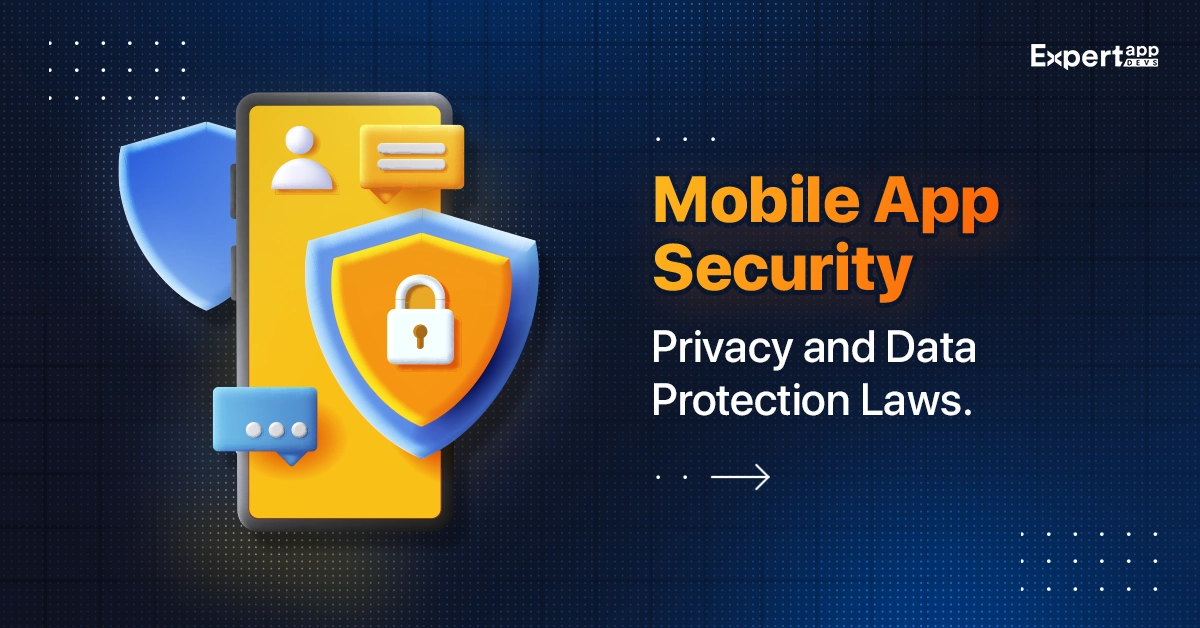Privacy and Data Protection Laws for Mobile App Development
In the ever-expanding and exponentially driven mobile app landscape, innovation mimics the fast-paced moves of a Blockbuster film. The data protection laws are the unsung heroes of this brilliant narrative.
Let's picture a scene from a cybercrime thriller where an app conglomerate is faced with a data breach. The cyber attack is about to strike. Just then, the data protection laws make a delightful entry and thwart the antagonists. They save you from an impending crisis.
They intercept the vulnerabilities before they materialise in someone's brain and safeguard you from them. If you are still wondering why you need such proactive action heroes on the cyber grounds, picture this.
There are nearly 2 million apps on the Apple store. Imagine the kind of stakes these entrepreneurs and app owners have. Combine it with the stakes on the digital playground, and you have your answer.
The digital era has also seen a rise in stringent laws and their systems. This article will be your guiding compass to navigate the complexities of data protection laws. As we dig deeper into this $222 billion cybersecurity world, we will take notes of why adherence to these laws is essential.

A Look into the Mobile App Ecosystem
At the core of your pulsating mobile app ecosystem is a beautifully woven maze of risks and obligations. These nuances merge to put across the beautiful narrative of vigilance and responsibility.
There is a need to mitigate the risks, guard the private data, and protect your assets with all that you can stand tall.
- When discussing risks, you are not just looking at data vulnerabilities or breaches. That puts a stop to your growth journey. But there is a lot beyond these risks.
- Bugs that can become vulnerabilities, malicious attacks, non-adherence to compliances, and hidden incapability can add to the risks.
- Much like the Avengers protecting the universe, your protection laws are to stay vigilant against potential breaches. They can also use profiling and tracking to mitigate the risks and build a stronger fort.
- Developers, owners and regulatory bodies virtually streamline to ensure the best practices for development. They are all crucial for delivering highly secure and compliant solutions.
- The ecosystem actors have the onus of creating applications that adhere to legal and ethical obligations. They must have defined user agreements that specify how data will be used.
- Moreover, advertisers must avoid deceptive practices and align with the industry standards to ensure user's privacy.
- Lastly, there should be an operational framework that can improve the data security and reduce the risks.
To swiftly waltz through the digital domain, your data processor and controller should enter into a contract. The agreement should discuss all aspects, including the nature, scope and purpose of processing, security measures and confidentiality agreements. The ecosystem is complete with these agreements that will help you thrive despite growing cybercrime.
What is Privacy and Data Laws?
In Hunger Games, you read about a dystopian society led and abused by a centralized power. That's what the privacy and data protection laws aim to break. It distributes the power and protects the individuals in the society. This fosters a sense of autonomy amongst your users.
Privacy and data laws are well-defined frameworks that lead the collection and regulation of data on mobile applications. It is designed to protect the personal data and keep your users safe.
Privacy laws focus on offering the individual's right to privacy. Privacy and data protection laws emphasize the usage of the data available to users.
The framework abides by user consent and rights that translate into the usability or availability of data.
While the framework is defined, you must communicate it to your user. Clear communication and transparency can assure the best implementation and successful outcomes.
We have seen the importance and definition of privacy and data laws. Let's look at the top laws that will impact mobile app development.
Privacy and Data Laws Impacting Mobile App Development

✔ PDPB (India's Personal Data Protection Bill)
Personal Data Protection Bill (PDPB) is India's regulatory framework that allows you to protect personal data. It provides mobile app users with greater control over their information.
Using this framework, you can include transparency and accountability in your application. It draws inspiration from the global GDPR frameworks renowned for privacy and protection.
The Key Principles
- Consent is one of the critical pillars of this framework. You can use the data only if your user consents to sharing it. You should offer clear instructions for opt-in on the app interface.
- There is a difference between data and private data. You must ensure that confidential or personal data is localised to the device. Bank passwords and other details should be stored on the device while adhering to the regulations.
- You will work with a privacy and data protection authority who will monitor compliance. This will reduce oversight and ensure proper implementation.
- Developers must adapt to the minimisation requests by the framework. They should implement forms that seek data primarily necessary for your business.
- Frameworks demand transparency throughout. You must have proper pages describing the protection laws.
Impact on Mobile App Development
- This framework encourages you to build a more user-centric application that prioritises user experience. It ensures you offer information regarding data practices with clarity to the users.
- Consent and data localisation improve the data security within the application. It ensures better risk management.
- As you adhere to the legal compliances in the region, you mitigate the risk associated with legal consequences or penalties.
Top 3 Best Practices
- Design interfaces that will help your users offer explicit consent for using the data
- Conduct frequent data audits to ensure it is aligned with the principles of the framework.
- Collaborate with the authorities to check on compliance and avoid oversights.
✔ Digital Markets Act
Europe's Digital Markets Act is a leading body that aims to regulate online platforms. Implementing this framework can guarantee a level field for all the players in the digital ecosystem. You can overcome the challenges of large online platforms to establish a fairer competition.
The Key Principles
- Due to their incredible power, DMA defines certain online platforms as the gatekeepers of the online market. They will introduce obligations to these players so they don't start using their power to create a monopoly.
- This framework encourages interoperability among the several digital platforms. This means your users can interact across several platforms seamlessly. This will ensure smooth and transparent digital practices, keeping your user safe.
- One of their core principles is to prohibit all unfair practices. You cannot self-proclaim to be a gatekeeper. The regulatory body is the sole decision-maker in this case.
- They can easily investigate the market concentration and how it will impact competition.
Impact on Mobile App Development
- You must consider exploring the different distribution channels. This will ensure there is increased credibility for your application.
- You must use fair and transparent practices when promoting your apps across platforms. This will influence your visibility in the right direction.
- Interoperability compliance is a must to improve user flexibility. This will enhance their experience.
Top 3 Best Practices
- Avoid relying on a single distribution channel by looking for alternatives
- Encourage transparency in user reviews and ratings for fair promotions
- Monitor your digital platform and stay up-to-date with the latest updates to upgrade your compliance.
✔ California Consumer Privacy Act
CCPA hands the entire data orchestration to your users. Your users will decide how much they wish to share. They will know how data is collected, transferred and stored through the digital platform. This regulation dictates privacy and data protection on the user's terms.
The Key Principles
- CCPA grants every user of your mobile app the right to know and access their data. They control the data movement on the platform.
- Your app must collect the minimum required data from the user. It ensures that businesses don't accumulate unnecessary data irrelevant to their business.
- All the privacy and protection policies must be made known to the users. Transparency is the key to credibility, and this law ensures complete clarity.
- No discrimination will be made between users who are ready to share and those who are withholding the information.
Impact on Mobile App Development
- You must add concise and clear privacy details and make them accessible. You must mention the collection process and purpose to the user.
- Incorporate opt-out methods for a more user-friendly interaction with your application. This will ensure respect towards your users.
- Make sure to conduct data mapping and inventory evaluation. It will help you adhere to the data minimisation requirements.
Top 3 Best Practices
- Your consent methods should be robust, informing users about collection and processing methods.
- Audit your data privacy and compliance regularly. You can adapt to the new and updated framework for better protection.
- Implement a responsive support channel that can address user queries and requests immediately.
✔ GDPR
Created by the European Union, GDPR is the vigilant guardian of your app's personal data. It handles the privacy and security policies with a tinge of transparency and accountability.
It empowers owners with the right to control and access the information on their database. It will prioritise the user's privacy and autonomy in the digital realm before setting the rules.
The Key Principles
- The personal data must be processed legitimately and fairly while abiding by the law.
- According to the framework, users are the rightful owners of the data. They are empowered to access, change and erase the data.
- This framework also dictates data minimisation, which allows businesses to call for need-based data.
- As the framework calls for accountability, businesses must be transparent about their data practices.
Impact on Mobile App Development
- You must take the privacy-by-design approach that allows you to integrate privacy from the start.
- Apps must seek explicit consent from users for the best data protection and processing.
- Implementing stringent data security measures can help protect your app against breaches and vulnerabilities.
Top 3 Best Practices
- If you were processing high-risk activities on your application, implement DPIA (Data Protection Impact Assessments). This will reduce risks and oversight.
- Ensure you create a comprehensive and transparent privacy policy for the users. This will help them trust and share the data.
- Regularly auditing your mobile app's compliance with GDPR can help improve the app's credibility.
✔ Asia Pacific Privacy Regulations
The Asia Pacific Privacy Regulations framework is the protective pillar of your user's information. They are crafted to handle the data responsibly and ensure complete transparency. The culture and the dynamic digital environment define the principles.
The Key Principles
- Informed consent is the top feature of the APPR regulation framework. It ensures the users are well-informed about data collection and processing techniques.
- Data minimisation ensures that only data needed by apps are collected from users. This provides clear data-collection practices.
- It allows for streamlined and secure data transfer across borders while protecting personal data.
- You can prevent unauthorised access and data alterations using robust privacy and security measures.
Impact on Mobile App Development
- Every business must personalise its data processing abilities to comply with the region-specific legal and ethical principles.
- The consent mechanisms should be user-friendly. Make sure to include information that users are ready to share. Moreover, you must provide an opt-out mechanism.
- Implement methods that can improve cross-border data transfer seamlessly. Ensure complete encryption and security.
Top 3 Best Practices
- It is crucial to conduct privacy impact assessments across the mobile application. You can evaluate the impact of data processing on the user's data privacy.
- Make sure your privacy policies are culturally driven. Align it with local policies and ethical practices.
- Audit the mobile application data for privacy regulations. Proactively update the privacy to meet new guidelines.
✔ Data Protection Directive
Directed by the European Union, DPD enhances your user's journey with improved data protection practices. The law was designed to ensure fair processing and assign users complete control over data. It ensures a smooth movement across the digital realm without letting your data fall prey to the hawks.
The Key Principles
- One of the core principles calls for fair data processing methods. This establishes the accuracy of data. Moreover, it ensures that the data is used for legitimate purposes.
- It helps take a unified approach towards data protection across the EU
- Individuals are rightful owners of the data. They are the only ones who can permit the access or rectification of the data shared
- A cohesive approach for seamless and effective transfer of data across borders
Impact on Mobile App Development
- The mobile app developers of your business need to craft a legal framework that adheres to the regulation. This can help them with data processing within the application.
- Developers must identify standards to help unify the data and streamline cross-border compliance. This can help with data sharing.
- The data processing practices should be defined for the user. You must incorporate features that are in sync with your user's preferences.
Top 3 Best Practices
- The data protection law landscape is evolving. You must stay abreast with the latest standards and upgrades.
- Make sure you incorporate a transparent data processing method. This will increase trust in your business among users.
- Check if your compliances adhere to the local practices and laws.
The Enforcement Authorities for the Compliances
Each jurisdiction has its enforcement authority that works towards data protection compliance. They will ensure that the mobile applications adhere to the guidelines. We will discuss the top authorities and their responsibilities.
- Federal Trade Commission (FTC): This falls under the United States jurisdiction. It handles the data protection and privacy compliances for businesses operating here. They will enforce fair practice and ethical laws for the country. They will ensure the companies take note of personal information handling practices.
- Information Commissioner's Office (ICO): This UK-based enforcement authority regulates data protection practices. It will monitor the laws to ensure they comply with the standard practices. The authority will offer educational insights into practices and help investigate data breaches.
- Data Protection Authority (DPA): This European Union-based enforcing authority ensures you are in sync with the laws. It works with the European Data Protection Board to streamline the implementation of GDPR.
Privacy Impact Assessments, Compliance Strategies and Penalties
When implementing the privacy and data protection laws, you must adhere to the PIAs (Privacy impact assessments). Knowing the possible strategies to implement and the penalties you may incur is equally important.
Privacy Impact Assessments
A privacy impact assessment is a process of evaluating an application or part of the system. It will help realise how this system impacts user's privacy. Once you have the reports, you can decide to mitigate the risks and improve protection.
As your application will regularly process data, it is vital to implement these assessments. You can promote the data responsibly and ensure the best solutions.
To conduct a thorough PIA, you must determine the data's purpose and the need for assessment.
Compliance Strategies
Here are a few strategies that can help adhere to the defined compliances
- Review your application's privacy policy regularly. Ensure it is aligned with the procedures and policies defined by the data protection laws
- Train every employee on these data protection and privacy laws. Please make sure they are aware of the best practices and importance of these compliances
- Conduct data mapping activities to ensure transparency across the information flow. This will encourage users to trust you
- Take the privacy-by-design approach, where you implement the privacy policies during the design stage.
Penalties
- Monetary fines are imposed on you if your app violates the data protection laws. The severity of your violation will determine the amount for your fine.
- You may damage your reputation in the digital realm if you don't comply with the laws. These laws can define your public perception.
- In some cases, you may face criminal charges.
We have discussed the implications of data protection laws on the digital landscape. Let's look at how the current technologies can enhance these frameworks.
Latest Technologies in Data Protection
Implementing the latest technologies, such as AI-ML, and biometrics, can improve the app's security. It can ensure better data protection guidelines. Each new technology also extends specific limitations.

Artificial Intelligence and Machine Learning
Artificial Intelligence with Machine Learning can analyse diverse data sets. This will help them identify the pattern concerning threats and suspicious activities. The systems can create algorithms by analysing and incorporating these patterns. You can proactively detect security breaches with these algorithms.
It also helps analyse your user's behaviour. You will know of anomalies in the transaction faster. This would prevent data misuse.
Limitations and Ethical Considerations
- AI can use inherent biases while defining the training data. It can lead to inaccurate and biased outcomes.
- Complex algorithms may not be very transparent. This can impact your decision-making and accountability.
Biometric Solutions
Biometric solutions can improve the security and authentication of your apps. Users can access the app data with their fingerprint or iris scan. This also ensures that each authentication is linked to a unique and non-reproducible profile.
Limitations and Ethical Considerations
- It is important to have proper safeguarding and consent mechanisms. This can reduce the concerns related to privacy with biometrics.
- There is a possibility of unauthorised access to data safeguarded by biometrics. You must offer two-way protection to this data.
Facial Recognition
Your app allows entry to users only when it captures and recognizes their faces. It also abides by the laws of the enforcement agencies. This method will ensure that the user can be identified by their face. It helps locate the user faster and improves general safety.
Limitations and Considerations
- The recognition technology has inherent biases that extend inaccuracies. You must address these biases for ethical implementation.
- This approach raises concerns about mass surveillance, impacting your user's privacy. You must determine how to balance this approach with the data protection approach.
Challenges of Implementing Data Protection Laws
You face several challenges while implementing these laws in your mobile application.
Complexity of laws
You may find the legal language used in these laws complex and unclear. Moreover, it may include the specifics for each jurisdiction. The developers must unravel the specifics before implementing. This can become complex and challenging for the owners.
Enforcement
The current enforcement methods may not be consistent with the requirements. In some cases, they may be insufficient. This can create gaps and lead to non-compliance. Lack of resources could be a reason for inadequate and gaps in enforcement. This can cause data protection issues.
Lack of awareness
Businesses and individuals developing mobile applications may not be aware of the data protection laws. In some cases, they aren't fully equipped with the requisite knowledge. It can hamper privacy and data processing rights. They may also create non-compliant apps.
Training
The resources are not trained in handling data protection and privacy laws. They aren't fully equipped to implement these compliances. As a result, it may cause unintentional breaches that may impact the business.
Legal uncertainties
As the tech landscape and business models evolve, the legal frameworks may not be aligned with the newer needs. This can cause uncertainties on how to handle the latest data. Moreover, you must identify ways to ensure emerging technologies comply with the legal frameworks.
Conclusion
The stakeholders of the mobile app development landscape are tasked with the responsibility of managing the user's data. Navigating the data protection laws, they must stay vigilant and highly aware.
It is not just about a legal responsibility anymore; developers and businesses must breathe these laws to build trust among the audience and enhance credibility.
You must grasp these laws' principles and best practices to craft a protected application. You can embrace protection in every code and pixel using the key components and addressing the ethical considerations.
Expert App Devs, a leading mobile app development company, can walk this path with you. Our expert team understands these laws and has devised the best implementation approach. You can check our extensive portfolio to know how we work with jurisdiction-specific law.
You can visit numerous resources and specific websites to learn more about data protection laws.
 Jignen Pandya
Jignen Pandya





